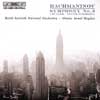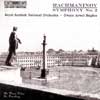Rachmaninov Symphony No 2
Leisurely and rather less red-blooded than some, but Hughes’ restraint pays dividends
View record and artist detailsRecord and Artist Details
Composer or Director: Sergey Rachmaninov
Genre:
Orchestral
Label: BIS
Magazine Review Date: 12/2002
Media Format: CD or Download
Media Runtime: 68
Mastering:
Stereo
DDD
Catalogue Number: BISCD1299

Tracks:
| Composition | Artist Credit |
|---|---|
| Symphony No. 3 |
Sergey Rachmaninov, Composer
Owain Arwel Hughes, Conductor Royal Scottish National Orchestra Sergey Rachmaninov, Composer |
| Symphony, 'Youth' |
Sergey Rachmaninov, Composer
Owain Arwel Hughes, Conductor Royal Scottish National Orchestra Sergey Rachmaninov, Composer |
| Vocalise |
Sergey Rachmaninov, Composer
Owain Arwel Hughes, Conductor Royal Scottish National Orchestra Sergey Rachmaninov, Composer |
Composer or Director: Sergey Rachmaninov
Genre:
Orchestral
Label: BIS
Magazine Review Date: 12/2002
Media Format: CD or Download
Media Runtime: 67
Mastering:
Stereo
DDD
Catalogue Number: BISCD1279

Tracks:
| Composition | Artist Credit |
|---|---|
| Symphony No. 2 |
Sergey Rachmaninov, Composer
Owain Arwel Hughes, Conductor Royal Scottish National Orchestra Sergey Rachmaninov, Composer |
Author: Edward Greenfield
Hughes’ performance of the Second is expansive not only in the tempi he chooses and in his expressive style, but in his decision to observe the rarely-performed exposition repeat in the first movement. So the first movement alone lasts just over 25 minutes, a span such as one associates with Bruckner and Mahler rather than Rachmaninov. Almost inevitably there is markedly less tension and thrust than in Previn’s fine version that I have listed for comparison. Even so, the performance lacks little in expressiveness. Hughes in his moulding of phrases tends towards a tenuto style, holding back rather than pressing forward, which largely accounts for the relative lack of thrust compared with Previn and Ashkenazy.
That suggests an element of self-indulgence in the first movement and in the Adagio slow movement, but the Scherzo – light and taut at a regular Allegro molto – has no such problems, and though the basic tempo of the finale is on the slow side, the rhythmic spring carries it forward persuasively enough, with the grand final climax following the pattern of the whole in a finely controlled balancing of textures and dynamics rather than a passionate outburst. One obvious advantage of having the sound slightly distanced is that the great clarinet solo at the beginning of the Adagio sounds all the more ethereally beautiful at a genuine pianissimo, most sensitively played by John Cushing. This is a reading for those who prefer to meditate over the beauty of this Rachmaninov masterpiece rather than to be swept away by its red-blooded romanticism.
While Hughes’ restraint in the Second Symphony results in a certain lack of emotional thrust, this approach in the Third, so far from being damaging, brings advantages. That is most notable in the central Adagio, where the lovely horn solo at the start and the sweet solo violin entry at a full pianissimo have a tenderness that is most moving. The central Scherzando also gains from having such fine inner detail revealed by the recording. Though in the finale the treatment is more expansive than ever, Hughes holds the structure together well to bring a triumphant close with the wildly syncopated rhythms in the coda sharply exciting.
The symphonic movement in D minor, written in 1891, which has been dubbed Rachmaninov’s Youth Symphony, may merely hint at his mature style, but it makes an attractive fill-up, even though the violins of the RSNO are not as refined as elsewhere. Vocalise, though, brings a touchingly refined and restrained reading of a popular piece that has often prompted much heavier-handed accounts.
Discover the world's largest classical music catalogue with Presto Music.

Gramophone Digital Club
- Digital Edition
- Digital Archive
- Reviews Database
- Full website access
From £8.75 / month
Subscribe
Gramophone Full Club
- Print Edition
- Digital Edition
- Digital Archive
- Reviews Database
- Full website access
From £11.00 / month
Subscribe
If you are a library, university or other organisation that would be interested in an institutional subscription to Gramophone please click here for further information.




